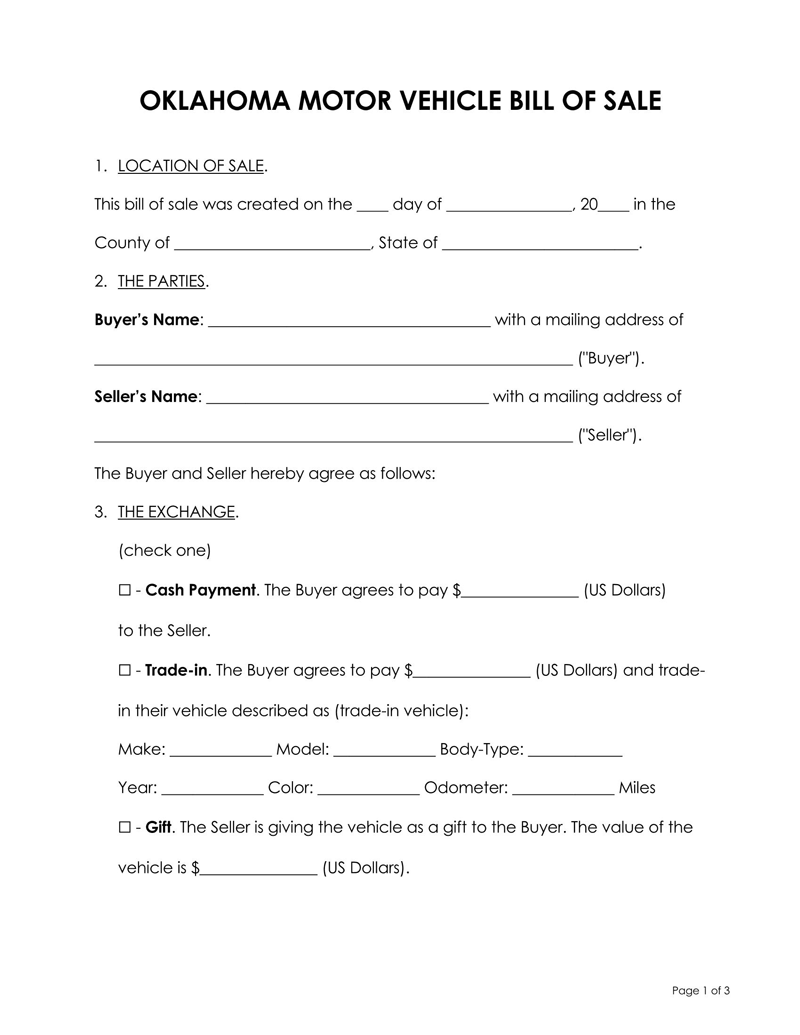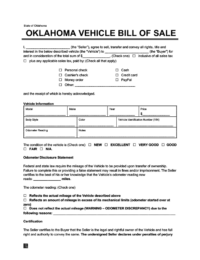Legal Requirements for Used Car Returns in Oklahoma
Returning a used car in Oklahoma can be tricky, especially since laws around used vehicle returns aren’t as straightforward as those for new cars. Buyers often assume they have a cooling-off period or automatic right to return the car, but that’s not usually the case. However, certain circumstances do allow for a return. Understanding the legal requirements and what protections exist is essential for making informed decisions. Let’s break down what you need to know before pursuing a return.
Conditions for Returning a Used Car: What to Know

When it comes to returning a used car in Oklahoma, there are specific conditions that must be met. Buyers cannot simply return the car because they changed their minds. However, returns may be possible under the following situations:
- Misrepresentation or fraud: If the seller misrepresented the condition or history of the car, you may have grounds to return it.
- Contractual agreement: Some dealerships offer return policies in their sales agreements. Be sure to check your paperwork.
- Lemon law protection: Oklahoma’s Lemon Law may apply to used cars in certain cases, though it primarily protects new car buyers.
It’s essential to understand the terms of the sale and any warranties provided. If the vehicle has a serious defect that wasn’t disclosed, or if the dealership has specific return policies, you may have the right to return it. Always check the terms before finalizing any return attempts.
Oklahoma’s Lemon Law and Its Application to Used Cars
Oklahoma’s Lemon Law primarily covers new cars, but it can sometimes apply to used vehicles under specific conditions. The law aims to protect consumers from defective cars, but its reach into used cars is limited. Here’s what you should know:
| Criteria | Explanation |
|---|---|
| Car Warranty | If the used car is still under its original manufacturer’s warranty, it may qualify for Lemon Law protections. |
| Significant Defects | The vehicle must have a substantial defect that affects its safety, value, or operation. |
| Repair Attempts | If the dealer or manufacturer has made multiple unsuccessful attempts to fix the defect, the Lemon Law may come into play. |
While Oklahoma’s Lemon Law does provide limited protection for used cars, most issues with used vehicles are handled through other consumer protection laws. Understanding whether your situation qualifies under the Lemon Law is crucial when considering legal action.
Dealer Obligations When Selling a Used Car
When a dealer sells a used car in Oklahoma, they must adhere to certain legal obligations to ensure the sale is fair and transparent. These responsibilities exist to protect buyers from fraud and misrepresentation, and they apply to both independent dealers and certified dealerships. Understanding these obligations can help you know what to expect from a seller.
Some of the key dealer obligations include:
- Accurate disclosure of the vehicle’s condition: Dealers are required to disclose any known defects or issues with the vehicle. This includes mechanical problems, past accidents, and title status (such as whether the car has a salvage title).
- Providing a written agreement: The sale of a used car should come with a written sales contract. This agreement outlines the terms of the sale, including any warranties, return policies, or “as-is” conditions.
- Warranties: If a car is sold with a warranty, the dealer must provide details about what the warranty covers and for how long. If the car is sold “as-is,” the dealer is not responsible for future repairs.
- Title transfer: The dealer is responsible for ensuring that the title is properly transferred to the new owner after the sale is completed.
Failure to meet these obligations can give buyers grounds for legal action. It’s important to carefully review any paperwork and inspect the vehicle before making a purchase.
Buyer’s Rights When Returning a Defective Used Car
Even if you’ve bought a used car, you still have rights as a consumer if the vehicle turns out to be defective. Oklahoma law provides several protections for buyers, especially when the defect significantly affects the car’s performance or safety. Knowing your rights can help you take the correct steps if something goes wrong with the car.
Here are some important buyer rights when dealing with a defective used car:
- Right to repair: If the car has a defect, you have the right to ask the dealer to repair it, especially if it’s still covered under warranty.
- Right to refund or replacement: Depending on the severity of the defect, you may be entitled to a refund or replacement, particularly if the dealer cannot fix the issue after multiple attempts.
- Right to disclosure: If the dealer did not disclose a significant issue with the car at the time of sale, you may have the right to return it under fraud or misrepresentation claims.
If you’re facing issues with a used car, it’s important to document everything, including any communication with the dealer and attempts to repair the vehicle. This documentation can be crucial if legal action becomes necessary.
Steps to Take if a Dealer Refuses to Accept a Return
If a dealer refuses to accept the return of a defective used car, it can be frustrating, but there are steps you can take to protect your rights. Oklahoma law offers several options to resolve disputes between buyers and dealers. Here’s what you can do:
- Review your sales contract: Check the terms of your sales agreement to see if the dealer had any specific return policies. If the car was sold with a warranty, make sure you understand what is covered.
- Contact the dealer: Start by communicating with the dealer to express your concerns. It’s helpful to do this in writing, so you have a record of the interaction.
- File a complaint with the Oklahoma Motor Vehicle Commission: If the dealer continues to refuse the return, you can file a formal complaint with the Oklahoma Motor Vehicle Commission. They regulate car dealerships and can investigate consumer complaints.
- Seek legal advice: If the issue remains unresolved, consulting with an attorney may be necessary. An experienced lawyer can help you understand your legal options, including small claims court or other legal avenues.
By following these steps, you can ensure that you’re taking the right course of action if a dealer refuses to accept a return. Protecting your rights as a buyer is crucial in any car transaction.
Legal Options for Buyers in Used Car Disputes
When a used car purchase goes wrong, and you’re unable to reach an agreement with the dealer, you still have several legal options to pursue your case. Understanding these options can help you resolve the issue without feeling stuck. Depending on the situation, you may choose to negotiate, file a complaint, or take legal action. Let’s go over the legal avenues available to buyers in Oklahoma.
Some common legal options include:
- Negotiation: It’s often best to start by trying to negotiate directly with the dealer. Explain your concerns and see if the dealer is willing to repair the vehicle, offer a replacement, or issue a partial refund.
- Oklahoma Motor Vehicle Commission complaint: If negotiations fail, you can file a complaint with the Oklahoma Motor Vehicle Commission. This state agency regulates car dealerships and can investigate fraudulent practices, ensuring the dealer follows proper protocols.
- Small claims court: If the value of the dispute is below a certain threshold (usually $10,000 in Oklahoma), small claims court can be a faster and more affordable way to settle your case. You don’t need a lawyer for small claims court, but gathering evidence like receipts, repair records, and contracts is crucial.
- Hiring an attorney: For more complicated cases, or if your claim exceeds the small claims limit, hiring an attorney might be necessary. An experienced lawyer can advise you on the best course of action, whether it’s filing a lawsuit or negotiating a settlement.
Each legal option comes with its own process and potential outcomes. It’s important to document all interactions and evidence related to your dispute, as this will strengthen your case, should you need to pursue formal legal action.
Frequently Asked Questions about Used Car Returns in Oklahoma
1. Can I return a used car in Oklahoma just because I changed my mind?
No, Oklahoma does not have a “cooling-off” period that allows you to return a car simply because you changed your mind. You can only return the car under specific conditions like fraud or misrepresentation.
2. Does Oklahoma’s Lemon Law apply to used cars?
Oklahoma’s Lemon Law primarily applies to new cars, but in some cases, it may protect used cars that are still under their original manufacturer’s warranty and have substantial defects that affect their safety or value.
3. What should I do if the dealer refuses to accept my return?
If the dealer refuses to accept your return, you should review your sales contract for any return policy. If no resolution is found, you can file a complaint with the Oklahoma Motor Vehicle Commission or consider pursuing legal action through small claims court.
4. What is an “as-is” sale?
An “as-is” sale means the car is sold without any warranty, and the dealer is not responsible for any repairs after the sale. It’s important to thoroughly inspect the vehicle and be aware of this condition before buying.
5. Can I get a refund if the car has a serious defect?
In some cases, you may be entitled to a refund if the car has a substantial defect that the dealer is unable to repair after multiple attempts, especially if the vehicle is still under warranty or if fraud is involved.
Conclusion
Navigating the legal landscape of used car returns in Oklahoma can be challenging, but being informed about your rights and options makes the process easier. Dealers have obligations to disclose key information about the vehicle’s condition, and buyers have rights if the car turns out to be defective. Whether you’re negotiating directly with the dealer or considering legal action, understanding your legal protections will help you make more informed decisions.
In cases where you cannot resolve the issue on your own, legal options like filing a complaint with the Oklahoma Motor Vehicle Commission or pursuing small claims court are available. By following the right steps and keeping proper documentation, you can protect yourself in the event of a dispute. Always make sure to fully review contracts and warranties before finalizing a car purchase.


